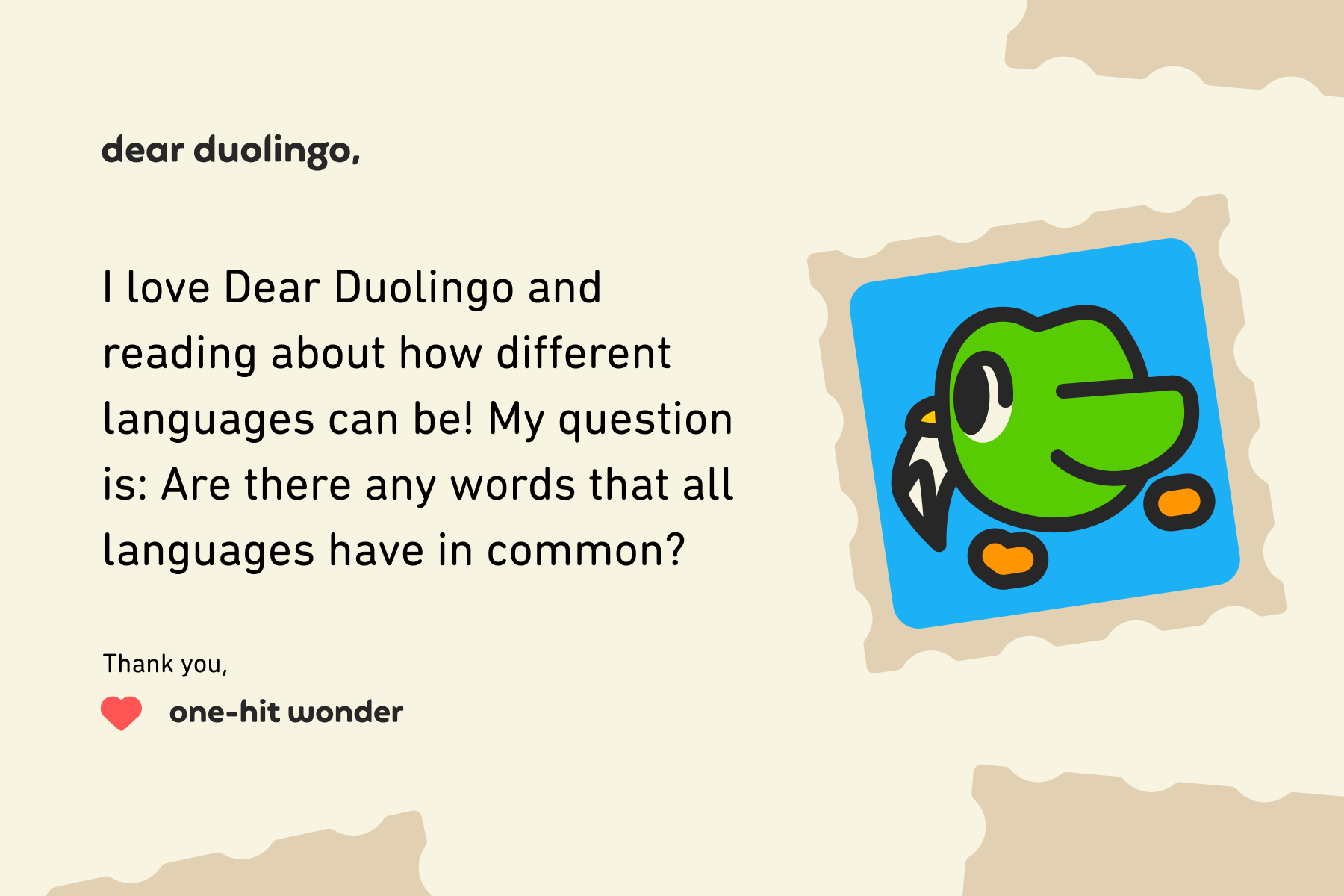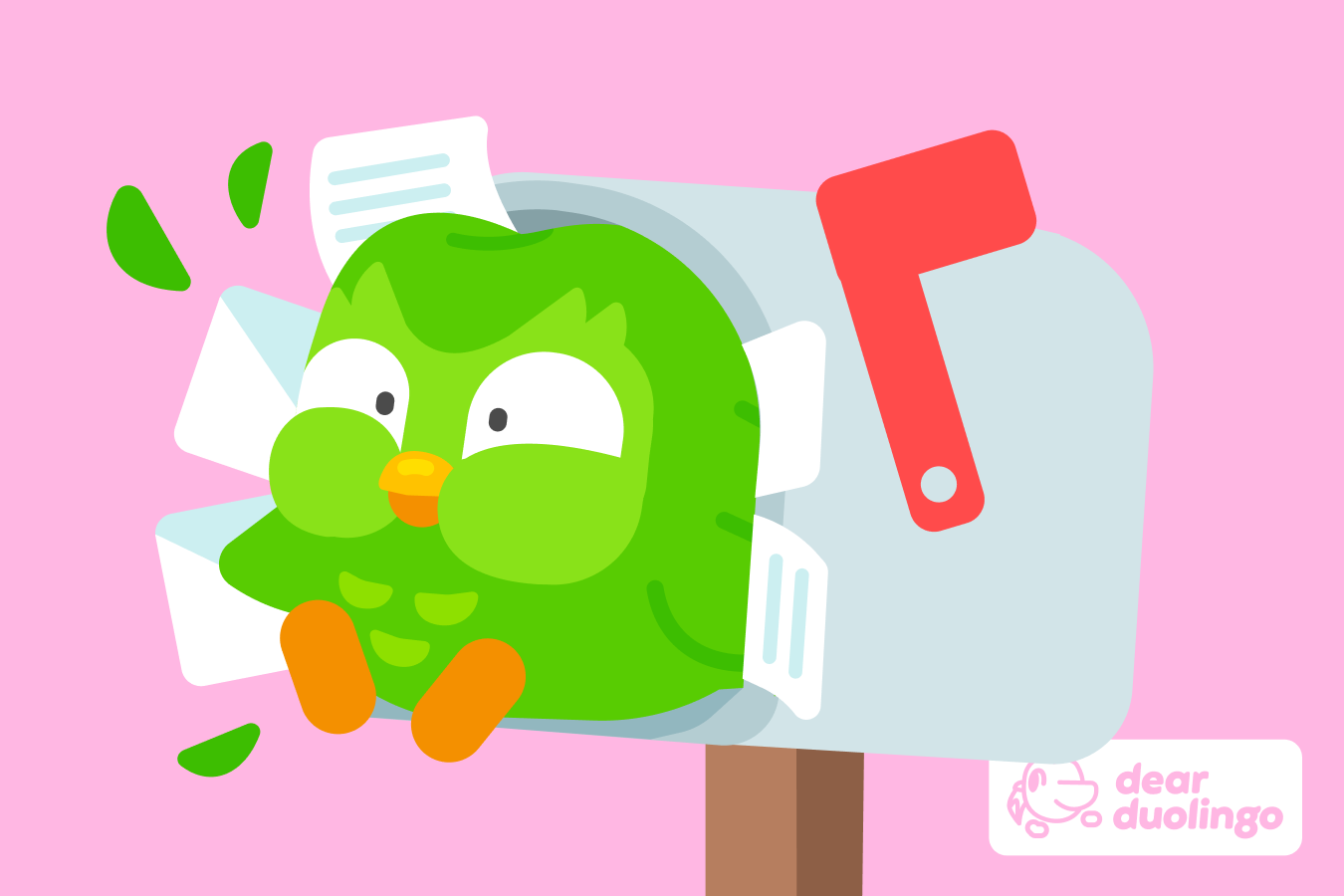Welcome to another week of Dear Duolingo, an advice column just for learners. Catch up on past installments here.
Hi, learners! This week’s question had me busy doing a lot of research, including consulting Dr. Emilie Zuniga, a hyperpolyglot. Let’s take a look!
Our question this week:

If you’re learning a new language, you already know that grammar can be wildly different, new sounds can be incredibly hard to learn, and of course each word is different! Even cognates—words that look and mean the same in different languages—can sometimes be misleading. Cognates get borrowed from one language to another, or they get passed down from an older language (like Latin) to the languages that evolve from it (like Spanish, French, and Italian).
But cognates are often limited to languages spoken in the same region, or are shared across languages that have been in contact with each other. Are there any words that made it outside their region to all languages?
For this post, I wasn’t able to research all 7000+ languages (unfortunately!). But I did look at a lot of them, and I found a surprising answer:
YES!!*
*Or, well… it seems like 2 words have come close. 😬 Let’s take a look!
Honorable mentions: 3 words that made it pretty far
Before we get to the (possible) winners, there are a few words to mention that really tried their hardest to make it around the globe. For these words, there are just a few options worldwide:
 |
 |
 |
🫖 Words for tea
Whether you take milk or sugar or prefer black or green, you probably call this drink either “tea” or “chai”—and both words originated from a single word used in east Asia long ago! Which one your language uses reflects the history of this beverage and how it traveled the world. Over the centuries that single word underwent many small changes to its pronunciation in different parts of China… leading to 2 distinct words today! Which word your language uses depends on which region of China speakers of your language were trading with.
Exceptions: For reader-crowdsourced exceptions, be sure to read our new post!
🍍 Words for pineapple
For this tropical fruit, there are basically 3 options around the world: words that sound like ananas, words that sound like abacaxi, and words having something to do with pine cones.
Ananas and abacaxi both come from words used by the Tupi, an indigenous community in South America, where this fruit comes from. Today, you’ll find a form of ananas in Hindi, Arabic, Swahili, and most European languages. Interestingly, both Tupi-origin words are used in Portuguese: Ananás is the word in Portugal, abacaxi is the word in Brazil, and the Portuguese-speaking Azores use both, for different kinds of pineapples!
Long ago, English used a form of ananas as well, but it was soon replaced by the word pineapple… which originally meant “pinecone”! In Germanic languages like English, apple was a generic word for any fruit, so a pineapple was the “fruit” of the pine tree. In the 17th century, 2 important things happened to change this: A new word pinecone came onto the scene for the pine tree fruits, and people started talking about an incredible new-to-them fruit that sort of looked like that pine tree fruit. Pineapple was repurposed for the new fruit!
Many languages that use pineapple-like words borrowed their word from English, although Spanish piña (like pino, “pine tree”) evolved separately for the same reasons!
Exceptions: Mandarin Chinese uses a different word for pineapple.
🍊 Words for orange
This citrus fruit has a similar story: A bitter orange fruit that originated in Asia was popularized and traded by merchants who used a variant of the Sanskrit word naranga-s (orange tree). But some centuries later, a new, sweeter orange made its way into markets worldwide, and it ended up being named after the Portuguese merchants who bought and sold it. So some languages use a naranga-s word (which was adopted into Persian, then Arabic, and then to European languages), and others use a word that sounds like portugal!
Those 2 words cover most languages, but there’s a third word in the mix: appelsin, and words like it. These variants are found in languages of northern Europe and in Russian and Ukrainian. This is another version of apple showing up with that general “fruit” meaning, and the suffix ‑sin comes from the Latin word for China (an appelsin is a “Chinese fruit” or “Chinese apple”).
Exceptions: Hindi, Mandarin Chinese, and Swahili use something besides these 3 options for “orange.” It’s also worth noting that some languages have different words for the fruit and the color, so one might be like the options here and the other could be something else!
Runners up: 2 words that *nearly* made it
 |
 |
🚕 Words for taxi
On this list, taxi is the newest, having only been coined in the early 20th century! Its swift adoption in languages worldwide reflects the growth of English, car culture, and this sort of car service that charges a fee (like a tax!).
Exceptions: Mandarin Chinese and Icelandic use their own words instead of taxi: 出租车 (chūzūchē) in Mandarin and leigubíl in Icelandic. Modern Standard Arabic uses سيارة أجرة. In all 3, the word is based on the words for “rent” and “car”! (Note that Arabic dialects typically use a word like “taxi.”)
🍅 Words for tomato
Now back to foods: tomato is another word and food that has spread across the globe. It comes from the Nahuatl word tómatl, and so many communities first encountered the food from the Spanish who called it a tomate.
Exceptions: Italian uses pomodoro, and some other languages use a word similar to the Italian one. Mandarin Chinese is another exception!
Our champions: 2 words that are the same worldwide
This pair pushed through borders when our runners up lost steam: You can use both words in basically any country and it has the same meaning everywhere. They might be pronounced slightly differently, or have an extra ending or prefix, but the core words have made it around the world—this time, even to Chinese.
Ready? 🥁🥁🥁
 |
 |
☕️ COFFEE
Like the other food words on this list, there was a time when coffee was unknown in much of the world. 😳 As it was traded and adopted in communities worldwide, the Arabic word قهوة qahwah was adopted along with it—and in the variants of qahwah you can see how languages tweak the sounds of a word to make it their own!
The Arabic “q” sounds is produced at the back of the throat, so other languages used whatever sound they had at the very back of the mouth (typically a “k” sound like in English coffee). The “w” in the Arabic word was also often replaced (not all languages have a “w” sound!)—the Turkish word kahve uses the “v” sound which is also made at the lips. It’s the Turkish word that was borrowed into many European languages, and so you can see an additional change from “v” to another lip sound: the “f” you know from English coffee, Spanish café, Italian caffè, etc.
Are there any exceptions? 🤔 Probably… but we don’t know them! (Tell us!)
🍫 CHOCOLATE
And alongside that hot cup of joe is the word for chocolate: It’s the same everywhere around the world! If a language has a word for this confection, then it’s based on a Nahuatl word or phrase for a drink made of ceiba and cocoa. The Spanish version of this word (probably quite a bit different from the original Nahuatl word) has been borrowed by communities worldwide.
When other communities and languages adopted this new food, they slightly altered the pronunciation and spelling to match their language. For example, German and Russian replaced the “ch” sound with “sh,” and Japanese added “o” to the end of the English word since Japanese words can’t end with “t” sounds.
Just like with the other semi-global words in this post, chocolate gets this honor because the food and idea of chocolate itself originated in one region and was unknown elsewhere—so when people first learned about the food, they learned the Nahuatl word for it at the same time, too. They went hand in hand! And as the product spread around the world, that single word was carried along for the ride.
So the world over, some variation of coffee and chocolate will get you exactly what you’re hoping for!
All for one, and one for all!
It’s fun to see what kinds of words many unrelated languages do share! And now you can be proud that you probably know 2 words in (nearly) every spoken language on earth. 😉
For more answers to your language and learning questions, get in touch with us by emailing dearduolingo@duolingo.com.
